How is the Digital Revolution Reshaping Logistics Industry?
The digital revolution is fundamentally reshaping the logistics industry, offering new possibilities and challenges. As technology evolves, logistics companies must remain adaptable and innovative to fully capitalize on this revolution's potential.

The logistics industry has historically played a critical role in facilitating the movement of goods and services globally. However, with the emergence of the digital revolution, the traditional logistics landscape is undergoing a revolutionary transformation. The convergence of advanced technologies, data-driven insights, and innovative solutions is reshaping the logistics industry in unprecedented ways. In this article, we will explore the profound impacts of the digital revolution on logistics, including enhanced automation and connectivity, the utilization of big data analytics and blockchain technology, and the growing importance of sustainability. By delving into these key areas, we will uncover how the logistics industry is becoming more efficient, transparent, and environmentally conscious in the digital era.
Automation and Robotics:
The digital revolution has led to widespread adoption of automation and robotics in the logistics industry. Advanced robotics systems, such as automated guided vehicles (AGVs) and drones, are revolutionizing warehouse operations and last-mile deliveries. AGVs navigate warehouses seamlessly, optimizing storage and picking processes, while drones facilitate faster and more accurate shipment drop-offs. Automated warehouses have become increasingly common, offering significant cost savings and quicker turnaround times. Additionally, robots' ability to handle tasks in hazardous environments enhances safety for workers. As technology continues to improve and costs decline, automation is poised to play an even more significant role in reshaping the logistics landscape.
IoT and Connectivity:
The Internet of Things (IoT) is revolutionizing supply chain management by enabling real-time connectivity between various devices and assets. IoT sensors collect critical data, including temperature, humidity, location, and condition, throughout the supply chain journey. This data-driven approach empowers logistics companies to efficiently plan routes, predict maintenance needs, and enhance inventory management. IoT-powered tracking and monitoring systems provide end-to-end visibility, enabling logistics managers to make data-driven decisions promptly. These insights not only help prevent delays but also foster transparency and customer satisfaction by providing accurate delivery updates. IoT-enabled smart sensors also ensure the quality and integrity of sensitive or perishable goods during transit.
Big Data and Analytics:
The logistics industry generates an enormous amount of data daily, and the digital revolution has unlocked the potential of big data analytics to optimize operations. Advanced analytics tools and artificial intelligence algorithms mine through this data, identifying patterns, trends, and opportunities for improvement. Predictive analytics facilitates demand forecasting, enabling logistics companies to allocate resources more effectively. Real-time data access enables agile decision-making to handle unforeseen challenges or disruptions promptly. Furthermore, analytics identifies inefficiencies in the supply chain, minimizing wastage, optimizing routes, and improving overall performance. Leveraging big data in logistics enables companies to stay competitive and agile in a rapidly changing market.
Blockchain Technology:
Blockchain technology is making a significant impact on the logistics industry by enhancing transparency, security, and trust in supply chain operations. The decentralized and immutable nature of blockchain ensures that every transaction and event is securely recorded on the ledger, creating an auditable trail from source to delivery. Leveraging blockchain, logistics companies can track the provenance of goods, ensuring authenticity and reducing the risk of counterfeiting. This technology is especially valuable in industries where traceability is paramount, such as pharmaceuticals and luxury goods. Additionally, blockchain fosters collaboration and trust among stakeholders, leading to smoother cross-border transactions and faster customs clearance.
Cloud-Based Solutions:
The migration to cloud-based solutions is transforming the logistics industry, offering greater scalability, cost-effectiveness, and real-time data accessibility. Cloud-based logistics platforms enable seamless collaboration among different supply chain partners, streamlining communication and reducing delays. The cloud's flexibility allows logistics companies to scale up or down as demand fluctuates, enabling them to respond swiftly to market dynamics. With real-time data accessibility, all stakeholders are well-informed, enabling proactive decision-making. Moreover, cloud-based solutions allow logistics businesses to leverage cutting-edge technology without heavy capital investments, leveling the playing field for both established players and startups.
E-Commerce and Last-Mile Delivery:
The digital revolution has propelled the growth of e-commerce, resulting in unprecedented demands for efficient last-mile delivery solutions. Consumers now expect faster and more flexible delivery options, prompting logistics companies to innovate. E-commerce giants like Amazon have driven the adoption of innovative strategies such as crowdshipping, where everyday individuals deliver packages during their daily commutes. Additionally, micro-fulfillment centers, strategically located closer to consumers, enable quicker order processing and reduced transit times. These innovative approaches are reshaping the logistics landscape and pushing the boundaries of efficiency.
Sustainability and Green Initiatives:
As environmental concerns gain prominence, the digital revolution is driving the logistics industry to adopt eco-friendly practices. Optimized route planning, the use of alternative fuel vehicles, and carbon offset initiatives are some examples of sustainable measures embraced by logistics companies. The integration of electric and hybrid vehicles in urban logistics operations reduces emissions and noise pollution. Sustainable practices not only reflect responsible business choices but also resonate with environmentally-conscious consumers who prefer eco-friendly products and services.
Conclusion:
The digital revolution is fundamentally reshaping the logistics industry, offering new possibilities and challenges. As Digital Transformation Company, logistics companies must remain adaptable and innovative to fully capitalize on this revolution's potential. Embracing emerging technologies, such as automation, robotics, IoT, big data analytics, blockchain, and cloud-based solutions, will be instrumental in transforming logistics operations and maintaining a competitive edge in the fast-paced digital era. Moreover, the growing emphasis on sustainability is pushing logistics businesses to adopt eco-friendly practices and reduce their environmental impact. As a result, the logistics industry is becoming more efficient, transparent, and environmentally conscious, paving the way for a seamless and sustainable supply chain that benefits businesses and consumers alike.





Comments
There are no comments for this story
Be the first to respond and start the conversation.